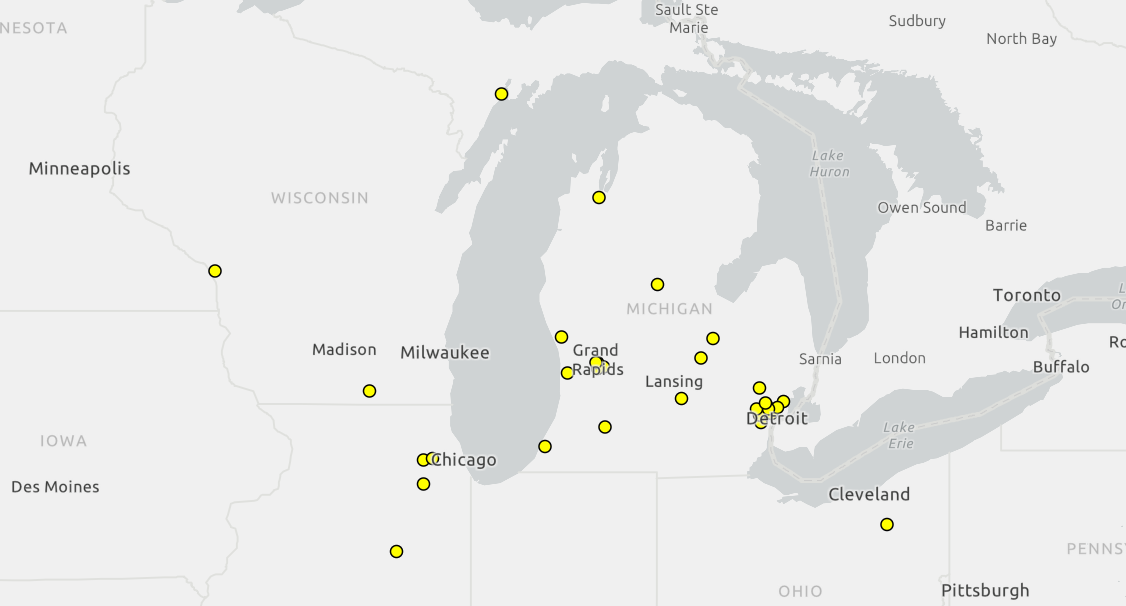By Elinor Epperson
Residents of Michigan’s Upper Peninsula have more options for recycling their old electronics. That’s because of Michigan’s Electronic Waste Take-Back Program.
The state program has opened nine more permanent drop-off locations for electronic waste since 2021, more than doubling the number of facilities in the U.P. The program makes sure Michigan residents have access to e-waste recycling that meets state regulations.
E-waste recycling facilities have been in the Lower Peninsula for years, but the majority are in the southern part of the state. No e-waste is recycled in the U.P.
Contractors pick it up from drop-off stations or events and transport it to recycling facilities in Wisconsin or the Lower Peninsula.
Old and unwanted electronics can leach harmful chemicals into the soil and water at landfills. They also contain valuable materials that can be reused, said Steve Noble, a recycling specialist at the state Department of Environment, Great Lakes and Energy.
“We’re missing the opportunity to reuse, especially, the precious metals that are in the circuit boards and the metal parts that are in most electronics,” he said. Noble runs the e-waste program and works with local stakeholders in the U.P. to provide more options for recycling e-waste.
One stakeholder is the Superior Watershed Partnership in Marquette, a nonprofit that serves U.P. communities and five tribes.
Safely discarding e-waste hasn’t been easy. That’s according to Kathleen Henry, a special projects coordinator for the watershed organization.
“It’s been challenging for the Upper Peninsula residents to properly dispose of e-waste,” she said. The rural nature of the area is a big part of that problem, Noble said.
“The challenge in the U.P. is simply the distance from any recycling location,” he said. Because curbside collectors can’t take e-waste, residents have to drop it off at a special facility. Those facilities have been scarce and could be hundreds of miles away.
Residents of the northern Lower Peninsula face a similar situation. For residents, it doesn’t make sense economically or environmentally to drive far to drop off a few devices, Noble said.
Cost is also a barrier, Henry said.
Historically, recycling e-waste came with high drop-off fees, “which can be a hindrance for people to properly dispose of their e-waste,” she said. The newer locations still charge, but they should be easier to afford.
“We’re trying to make those fees accessible, especially for U.P. residents,” she said. Fees vary depending on location and what is being recycled. They cover the cost of packing and shipping items to recycling facilities, Noble said.
Lack of awareness can be a problem, too.
Henry said, “I know a lot of community members were just holding on to their e-waste, not really knowing what to do with it.”
Education and outreach are “important components” of the pollution prevention work the organization does, she said.
Addressing these barriers makes recycling e-waste more convenient. And that convenience factor is huge, Noble said.
Henry agreed.
“Having set locations and even set times for community collection events gives residents the opportunity to put it in their calendar and have a known way to properly dispose of their e-waste,” she said.
In addition to 13 permanent drop-off centers –four of them run by Goodwill —the watershed organization continues to host single-day community drop-off events.
The state program has been “really helpful” for U.P. communities, Henry said.
But Noble said there’s still room for improvement because Michigan’s regulations on electronic waste have fallen behind the technology.
The current program started in 2008. Electronics weigh less now, meaning they’re cheaper to transport, he said. And current laws don’t ban dumping electronic waste in landfills.
“It’s time to update the program and make it work for the residents of the state.”
Elinor Epperson has an environmental reporting internship under the MSU Knight Center for Environmental Journalism’s diversity reporting partnership with the Mott News Collaborative. This story was produced for Michigan Public.

